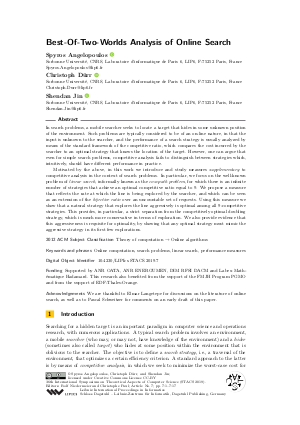@InProceedings{angelopoulos_et_al:LIPIcs.STACS.2019.7,
author = {Angelopoulos, Spyros and D\"{u}rr, Christoph and Jin, Shendan},
title = {{Best-Of-Two-Worlds Analysis of Online Search}},
booktitle = {36th International Symposium on Theoretical Aspects of Computer Science (STACS 2019)},
pages = {7:1--7:17},
series = {Leibniz International Proceedings in Informatics (LIPIcs)},
ISBN = {978-3-95977-100-9},
ISSN = {1868-8969},
year = {2019},
volume = {126},
editor = {Niedermeier, Rolf and Paul, Christophe},
publisher = {Schloss Dagstuhl -- Leibniz-Zentrum f{\"u}r Informatik},
address = {Dagstuhl, Germany},
URL = {https://drops.dagstuhl.de/entities/document/10.4230/LIPIcs.STACS.2019.7},
URN = {urn:nbn:de:0030-drops-102467},
doi = {10.4230/LIPIcs.STACS.2019.7},
annote = {Keywords: Online computation, search problems, linear search, performance measures}
}

 Creative Commons Attribution 3.0 Unported license
Creative Commons Attribution 3.0 Unported license






























